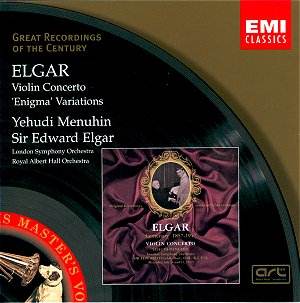This venerable recording has been released many
times over in the past decades, but has never sounded so good
as it does now. With hiss and crackle removed, clear highs and
solid bass line it is now completely enjoyable; not merely a treasured
document. As a performance it is a little more dramatic than I
prefer, since I was brought up more on the Sammons version. No
matter what everybody else in the world says I like the first
but not the second Kennedy version, and also like Pinchas Zuckerman
playing with Leonard Slatkin. But the conviction of this performance
sweeps any such considerations aside; while you are listening
these artists hold you completely bound. Before the recording
Yehudi Menuhin was considered an American (which he was, of course)
certainly an odd idea nowadays. But after this recording he belonged
to Elgar and eventually to England. Menuhin’s unique style was
already present and identifiable at the age of 16.
The Enigma is a remarkable performance,
very individual, with tremendous conviction. Parts of it are very
fast. Composers often play their own music too fast, simply because
before anybody else hears it they have heard it dozens, perhaps
hundreds of times, and have lost the sense of the balance of time
or may even dislike it. But Elgar plays this music with every
ounce of a father’s pride and a mother’s love and with excitement
and passion. There may be different performances than this, but
none any better. The sound may be not quite so clear as the Concerto
recording from 6 years later, but it is nearly so and equally
enjoyable.
There has been much discussion about Elgar’s
place in history and his works’ place in the repertoire. Prompted
by Vaughan Williams, I observe that Elgar is a member of the ‘Non-Germanic’
school, that his symphonic forms derive recognisably from Elizabethan
music. Those who feel Elgar’s was a failed attempt to imitate
Brahms misunderstand him and find all kinds of "errors"
in the music, and cut themselves off from the beauty and joy to
be found here. If Liszt had written a violin concerto, it might
have had some similarities to this one. If you have trouble understanding
the Liszt b minor piano sonata, try listening to it next to an
Elgar Symphony. Did William Byrd write a keyboard fantasia musically
depicting his friends in the various sections? Maybe he did and
we don’t know it.
And, of course, the ‘Enigma’ remains undeciphered.
A minor annoyance: The portraits in the program
booklet of the dedicatees of the variations in the ‘Enigma’ are
printed on what should be the open centrefold, but EMI have bound
four pages of catalogue listings from the GROTC series on top
of it. To keep the portraits on the fold from being cut in half,
one must open the staples and remove the catalogue pages then
recrimp the staples, hopefully without bloodshed. Someone at EMI
should have been able to work around this.
Paul Shoemaker
EMI
Great Recordings of the Century
